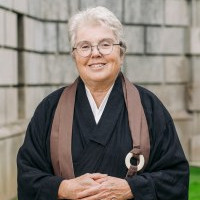Hendricks Chaplains Offer Ways to Find and Express Gratitude
During the holidays, we come together with family and friends to celebrate. The end of another year is also an opportunity to reflect on the year that has passed and the meaning of the people and events that were part of our lives over the past 12 months.
SU News reached out to some of the chaplains at Hendricks Chapel to ask about gratitude—what gratitude means in their faith tradition; why gratitude is important in our lives and how it can be expressed to others. Learn more about their perspectives on gratitude.
Rabbi Ethan Bair—Jewish Chaplain
Jews are all about gratitude! Yehudim, “Jews” in Hebrew, has the same shoresh or “root” as Hoda’ah, gratitude. We are called “those who are grateful.” We have so much to be grateful for throughout Jewish history and memory.

We start every day all year with prayers and songs of gratitude to God and Shabbat is a day of rest on which we reflect on all that matters most and our gratitude: spending time with friends and family, practicing Judaism and protecting a day of rest for ourselves and our community in a hectic, capitalist world. The first prayer we say each morning as we get out of bed is “Modeh Ani Lefanecha”—“I thank you”—”for restoring my soul to me with compassion and for “Your faithfulness, God!” On Shabbat dinner tables everywhere, family members often share what they’re most grateful for from the past week.
Gratitude is in our bones and defines who we are as a people.
Sensei JoAnn Cooke, Buddhist Chaplain

In Buddhist practice, we try to be aware of what we call “the Three Poisons:” greed, anger and delusions. They are called the three poisons because they are the root of all of our suffering.
To end all suffering, we must wake up to our involvement with these poisons. When we express our gratitude, we transform those poisons. We cut through greed by not wanting more but being satisfied with what we have. We cut through anger, being grateful to our adversaries and the challenges they provide for opening our hearts. We cut through delusion about who we are and what matters.
No matter what the circumstances are, it is impossible to be suffering when you are grateful.
Imam Amir Durić—Muslim Chaplain

In Islam, gratitude starts with recognizing the countless blessings we enjoy every day and not taking them for granted. Two Arabic terms, hamd and shukr, refer to expressing gratitude and praise. Hamd is about praising God Almighty, while shukr is about thanking our Creator for what He gives and expressing gratitude to others. We use the phrase “Alhamdulillah“—”All praise is due to God” frequently in gratitude when someone asks us how we are doing, when we wake up healthy, when something good happens, after meals, in each unit of daily prayers, and so on. The first verse of the Qur’an starts with the phrase “Alhamdulillah,” highlighting the importance of gratitude. In other words, it is not just a feeling but an essential form of worship.
Gratitude is essential because it keeps our hearts connected to the source of all goodness and brings our attention to things we already possess. Rather than being desperate about something we don’t have, gratitude brings joy through appreciating and celebrating what we already have in our lives. Gratitude also fosters humility by acknowledging that we are not self-sufficient but depend on our Creator and the kindness of others around us. Gratefulness transforms our perspective and builds a positive mindset, making us more patient and resilient in challenging times.
We can express gratitude through small acts of kindness, helping others, sharing our resources, kind words, sincere thanks, smiles, praying and supplicating for those who have benefited us, and spreading good wherever we can.
Sanjay Mathur—Hindu Chaplain

Gratitude is difficult to define. It has been conceptualized as an emotion, an attitude, a moral virtue, a habit, a personality trait and a coping response. Gratitude is a sacred obligation (duty) that every Hindu is supposed to fulfill during their lifetime. This means appreciation for family, ancestors, cultural values, appreciation for God, appreciation for knowledge, skills and talents and appreciation for ecosystem. Gratitude is the appreciation of what is valuable and meaningful to oneself; it is a general state of thankfulness and/or appreciation.
Taking the time to feel gratitude may improve your emotional wellbeing by helping you cope with stress. It can help you learn to recognize the good things in your life despite our challenges. A good practice is to reflect on the good things that have happened. It can be as simple as enjoying a hot mug of coffee. It can also mean being grateful for a close friend’s compassionate support. Allowing yourself a moment to enjoy that you had the positive experience, no matter what negatives may exist in your life, lets positive feelings of gratitude bubble up. When we are grateful, we acknowledge the sacrifices of others and step up to make sacrifices when we are called to do so.
Simply giving thanks affects everything—the way we feel, think and act. This reminds us of all the things we have in life rather than focusing on what we lack.
Sophia Perez—Christian Protestant Assistant Chaplain, Non-Denominational

In my faith tradition, gratitude means taking a moment to pause and to thank God for what He has done for our lives. We often put praise and worship into practice to express to God how grateful we are for this gift of undeserving love.
Gratitude is important because we often live our lives in the fast lane; we wake up, go to work, sleep and do it again the next day. However, when we take a moment to be grateful and pause and give thanks to God, our friends or our family and all that they have done for us, it can often bring joy and encouragement into our lives, and motivation to do better and be better.
Gratitude can be expressed to others by simple things such as words of gratitude and/or a hug to a friend who has done something special for us or has lent us a hand in time of need. We can also be ready to help whenever our friend needs our assistance later in the future. Showing gratitude because someone has done something special for you can also be passed on to strangers whom you have not interacted with such as sharing a smile, holding the door, volunteering at a food pantry, etc.
Rev. Jee Hae Song—Christian Protestant Chaplain, United Methodist

Every year when the holiday season for Christians is about to begin, we encounter the day of Thanksgiving. Thanksgiving lends itself to helping us name the many ways we are blessed, focusing on the source of all blessings.
Where can we find gratitude? In the United Methodist tradition, it is often encouraged to read one of the Creation Psalms on Thanksgiving Day. These Psalms remind us that all that we enjoy, all that we are blessed of, and all that we are thankful for are attributed to God who provides all. And this Creator loves us and blesses us. This theology is best embodied, as we Christians believe, in the birth, life, death and resurrection of Jesus.
We are thankful to God when we know that all we have and are blessed with is from the Creator of the Universe.
Father Gerry Waterman, OFM Conv.—Catholic Chaplain

One of the Catholic Church’s favorite saints, St. Francis of Assisi, said that gratitude is the most perfect prayer since all we have is a gift from our loving God. Pope Francis said that gratitude can make the world a better place and that it can transmit hope. Gratitude can help us grow in charity, which according to St. Paul is the greatest virtue. Practicing gratitude can allow us to discover true Christian joy!
Gratitude can easily be expressed to others by acknowledging and thanking them for their presence in your life and for the difference they make in your world! Sometimes a smile does it most simply. I like to write (in cursive) thank you notes to share my gratitude.


